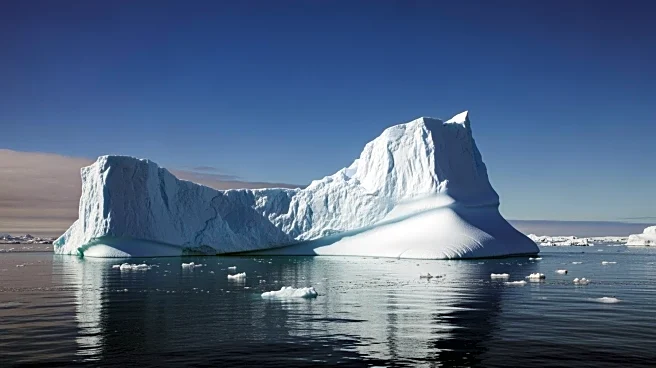What's Happening?
A recent study has revealed that the Hektoria Glacier on the eastern Antarctic Peninsula is retreating at a rate 10 times faster than previously measured. Researchers observed a five-mile retreat in just
two months, a significant acceleration compared to typical rates for grounded glaciers, which usually retreat less than 1,000 feet per year. The rapid retreat was triggered by the breaking of a large chunk of sea ice attached to the shoreline in January 2022, which led to further calving of ice from the glacier. The retreat has exposed the glacier's ice plain to the ocean, exacerbating the calving process and causing measurable earthquakes in the region.
Why It's Important?
The accelerated retreat of the Hektoria Glacier highlights the potential for significant contributions to sea level rise from Antarctic glaciers as global temperatures continue to increase. The western shelf of Antarctica, home to unstable glaciers like the Thwaites Glacier, known as the 'Doomsday Glacier,' and the Pine Island Glacier, is of particular concern. These glaciers already contribute to sea level rise, and similar calving events could destabilize sea levels further. Understanding the bedrock and dynamics of Antarctic glaciers is crucial for predicting future sea level changes and preparing for potential impacts on coastal communities worldwide.
What's Next?
The findings underscore the need for continued research into the bedrock and glacier dynamics in Antarctica. Scientists are likely to focus on monitoring other unstable glaciers, such as Thwaites and Pine Island, to assess their potential impact on sea level rise. The study calls for increased scrutiny and understanding of the factors driving glacier retreat, which could inform global climate policy and adaptation strategies for vulnerable regions.
Beyond the Headlines
The rapid retreat of glaciers like Hektoria may have broader implications for global climate patterns and ecosystems. As glaciers calve and contribute to sea level rise, they can alter ocean currents and temperatures, potentially affecting marine life and weather systems. The study highlights the interconnectedness of climate systems and the importance of comprehensive climate research to address these complex challenges.










